Śrīmad-Bhāgvatam – Canto 7
(Q&A Format)
Krishna is affected neither by prayers nor by blasphemy.
Because of the bodily conception of life, the conditioned soul thinks that when the body is annihilated the living being is annihilated. Lord Vishnu (Krishna), the Supreme Personality of Godhead, is the supreme controller, the Supersoul of all living entities. Because He has no material body, He has no false conception of “I and mine.” It is therefore incorrect to think that He feels pleasure or pain when blasphemed or offered prayers. This is impossible for Him. Thus He has no enemy and no friend. When He chastises the demons it is for their good, and when He accepts the prayers of the devotees it is for their good. He is affected neither by prayers nor by blasphemy.
Source: A.C. Bhaktivedanta Swami Prabhupada (2014 edition), “Srimad Bhagavatam”, Seventh Canto, Chapter 01 – Text 25
There are two ways of constantly thinking of Krishna – as a devotee and as an enemy.
“In Bhagavad-gita (4.10) the Lord says:
vita-raga-bhaya-krodha man-maya mam upasritah
bahavo jnana-tapasa puta mad-bhavam agatah
“Being freed from attachment, fear and anger, being fully absorbed in Me and taking refuge in Me, many, many persons in the past became purified by knowledge of Me–and thus they all attained transcendental love for Me.”” There are two ways of constantly thinking of Krishna–as a devotee and as an enemy. A devotee, of course, by his knowledge and tapasya, becomes free from fear and anger and becomes a pure devotee. Similarly, an enemy, although thinking of Krishna inimically, thinks of Him constantly and also becomes purified. This is confirmed elsewhere in Bhagavad-gita (9.30), where the Lord says:
api cet su-duracaro bhajate mam ananya-bhak
sadhur eva sa mantavyah samyag vyavasito hi sah
“Even if one commits the most abominable actions, if he engages in devotional service he is to be considered saintly because he is properly situated.” A devotee undoubtedly worships the Lord with rapt attention. Similarly, if an enemy (suduracarah) always thinks of Krishna, he also becomes a purified devotee. The example given here concerns the grassworm that becomes beelike because of constantly thinking of the bee that forces it to enter a hole. By always thinking of the bee in fear, the grassworm starts to become a bee. This is a practical example. Lord Krishna appears within this material world for two purposes–paritranaya sadhunam vinasaya ca duskrtam: to protect the devotees and annihilate the demons. The sadhus and devotees certainly think of the Lord always, but duskrtis, the demons like Kamsa and Sisupala, also think of Krishna in terms of killing Him. By thinking of Krishna, both the demons and devotees attain liberation from the clutches of material maya.”
Source: A.C. Bhaktivedanta Swami Prabhupada (2014 edition), “Srimad Bhagavatam”, Seventh Canto, Chapter 01 – Text 29
God is not responsible for the living entity’s accepting different types of bodies.
Here it is very plainly explained that God is not responsible for the living entity’s accepting different types of bodies. One has to accept a body according to the laws of nature and one’s own karma. Therefore the Vedic injunction is that a person engaged in material activities should be given directions by which he can intelligently apply his activities to the service of the Lord to become free from the material bondage of repeated birth and death (sva-karmana tam abhyarcya siddhim vindati manavah). The Lord is always ready to give directions. Indeed, His directions are elaborately given in Bhagavad-gita. If we take advantage of these directions, then in spite of our being conditioned by the laws of material nature, we shall become free to attain our original constitution (mam eva ye prapadyante mayam etam taranti te). We should have firm faith that the Lord is supreme and that if we surrender to Him, He will take charge of us and indicate how we can get out of material life and return home, back to Godhead. Without such surrender, one is obliged to accept a certain type of body according to his karma, sometimes as an animal, sometimes a demigod and so on. Although the body is obtained and lost in due course of time, the spirit soul does not actually mix with the body, but is subjugated by the particular modes of nature with which he is sinfully associated. Spiritual education changes one’s consciousness so that one simply carries out the orders of the Supreme Lord and becomes free from the influence of the modes of material nature.
Source: A.C. Bhaktivedanta Swami Prabhupada (2014 edition), “Srimad Bhagavatam”, Seventh Canto, Chapter 02 – Text 41
The living entity can live merely by his own power.
The living entity can live merely by his own power, without the help of skin, marrow, bone, blood and so on, because it is said, asango’yam purusah–the living entity has nothing to do with the material covering. Hiranyakasipu performed a severe type of tapasya, austerity, for many long years. Indeed, it is said that he performed the tapasya for one hundred heavenly years. Since one day of the demigods equals six of our months, certainly this was a very long time. By nature’s own way, his body had been almost consumed by earthworms, ants and other parasites, and therefore even Brahma was at first unable to see him. Later, however, Brahma could ascertain where Hiranyakasipu was, and Brahma was struck with wonder to see Hiranyakasipu’s extraordinary power to execute tapasya. Anyone would conclude that Hiranyakasipu was dead because his body was covered in so many ways, but Lord Brahma, the supreme living being in this universe, could understand that Hiranyakasipu was alive but covered by material elements.
Source: A.C. Bhaktivedanta Swami Prabhupada (2014 edition), “Srimad Bhagavatam”, Seventh Canto, Chapter 03 – Text 15 & 16
One who performs severe austerities for sense gratification is fearful to the entire world.
Although Hiranyakasipu performed austerity for a long, long time, he was nonetheless known as a Daitya and Raksasa. Even great saintly persons could not perform such a severe type of austerity. Why then was he called a Raksasa and Daitya? It is because whatever he did was for his own sense gratification. His son Prahlada Maharaja was only five years old, and so what could Prahlada do? Yet simply by performing a little devotional service according to the instructions of Narada Muni, Prahlada became so dear to the Lord that the Lord came to save him, whereas Hiranyakasipu, in spite of all his austerities, was killed. This is the difference between devotional service and all other methods of perfection. One who performs severe austerities for sense gratification is fearful to the entire world. whereas a devotee who performs even a slight amount of devotional service is a friend to everyone (suhrdam sarva-bhutanam). Since the Lord is the well-wisher of every living entity and since a devotee assumes the qualities of the Lord, a devotee also acts for everyone’s good fortune by performing devotional service. Thus although Hiranyakasipu performed such a severe austerity, he remained a Daitya and a Raksasa, whereas Prahlada Maharaja, although born of the same Daitya father, became the most exalted devotee and was personally protected by the Supreme Lord. Bhakti is therefore called sarvopadhi-vinirmuktam, indicating that a devotee is freed from all material designations, and anyabhilasita-sunyam, situated in a transcendental position, free from all material desires.
Source: A.C. Bhaktivedanta Swami Prabhupada (2014 edition), “Srimad Bhagavatam”, Seventh Canto, Chapter 03 – Text 15 & 16
Demigods who reside with Lord Brahma in satyaloka go to vaikunthaloka.
It appears that human beings and asuras are subject to death, whereas demigods are not. The demigods who reside with Lord Brahma in Satyaloka go to Vaikunthaloka in their present bodily constructions at the time of the dissolution. Therefore although Hiranyakasipu had undergone severe austerities, Lord Brahma predicted that he had to die; he could not become immortal or even gain equal status with the demigods. The great austerities and penances he had performed for so many years could not give him protection from death. This was foretold by Lord Brahma.
Source: A.C. Bhaktivedanta Swami Prabhupada (2014 edition), “Srimad Bhagavatam”, Seventh Canto, Chapter 03 – Text 21
Yajna means Vishnu.
In Bhagavad-gita it is clearly stated that there are many types of yajna performances recommended in the Vedic literatures, but actually all of them are meant for satisfying the Supreme Lord. Yajna means Vishnu. In the Third Chapter of Bhagavad-gita it is clearly stated that one should work only for satisfying Yajna, or Vishnu. The perfectional form of human civilization, known as varnasrama-dharma, is specifically meant for satisfying Vishnu. Therefore, Krishna says, “I am the enjoyer of all sacrifices because I am the supreme master.” However, less intelligent persons, without knowing this fact, worship demigods for temporary benefit. Therefore they fall down to material existence and do not achieve the desired goal of life. If, however, anyone has any material desire to be fulfilled, he had better pray for it to the Supreme Lord (although that is not pure devotion), and he will thus achieve the desired result.
Source: A.C. Bhaktivedanta Swami Prabhupada (2014 edition), “Srimad Bhagavatam”, Seventh Canto, Chapter 03 – Text 24
Lord Krishna is the original creator and Lord Brahma is the secondary creator.
“The Vedanta-sutra begins by declaring that the Absolute Person is the original source of all creation (janmady asya yatah). One may ask whether Lord Brahma is the Supreme Absolute Person. No, the Supreme Absolute Person is Krishna. Brahma receives his mind, intelligence, materials and everything else from Krishna, and then he becomes the secondary creator, the engineer of this universe. In this regard we may note that the creation does not take place accidentally, because of the explosion of a chunk. Such nonsensical theories are not accepted by Vedic students. The first created living being is Brahma, who is endowed with perfect knowledge and intelligence by the Lord. As stated in Srimad-Bhagavatam, tene brahma hrda ya adi-kavaye: although Brahma is the first created being, he is not independent, for he receives help from the Supreme Personality of Godhead through his heart. There is no one but Brahma at the time of creation, and therefore he receives his intelligence directly from the Lord through the heart.
Lord Brahma is described in this verse as the original cause of the cosmic manifestation, and this applies to his position in the material world. There are many, many such controllers, all of whom are created by the Supreme Lord, Vishnu. This is illustrated by an incident described in Chaitanya-caritamrta. When the Brahma of this particular universe was invited by Krishna to Dvaraka, he thought that he was the only Brahma. Therefore when Krishna inquired from His servant which Brahma was at the door to visit, Lord Brahma was surprised. He replied that of course Lord Brahma, the father of the four Kumaras, was waiting at the door. Later, Lord Brahma asked Krishna why He had inquired which Brahma had come. He was then informed that there are millions of other Brahmas because there are millions of universes. Krishna then called all the Brahmas, who immediately came to visit Him. The catur-mukha Brahma, the four-headed Brahma of this universe, thought himself a very insignificant creature in the presence of so many Brahmas with so many heads. Thus although there is a Brahma who is the engineer of each universe, Krishna is the original source of all of them. ”
Source: A.C. Bhaktivedanta Swami Prabhupada (2014 edition), “Srimad Bhagavatam”, Seventh Canto, Chapter 03 – Text 28
Of all sinful activities an offense to a Vaishnava is the most severe.
Of all sinful activities, an offense to a pure devotee, or Vaisnava, is the most severe. An offense at the lotus feet of a Vaisnava is so disastrous that Sri Chaitanya Mahaprabhu has compared it to a mad elephant that enters a garden and causes great havoc by uprooting many plants and trees. If one is an offender at the lotus feet of a brahmana or Vaisnava, his offenses uproot all his auspicious activities. One should therefore very carefully guard against committing vaisnava-aparadha, or offenses at the lotus feet of a Vaisnava. Here the Lord clearly says that although Hiranyakasipu had received benedictions from Lord Brahma, these benedictions would be null and void as soon as he committed an offense at the lotus feet of Prahlada Maharaja, his own son. A Vaisnava like Prahlada Maharaja is described herein as nirvaira, having no enemies. Elsewhere in Srimad-Bhagavatam (3.25.21) it is said, ajata-satravah santah sadhavah sadhubhusanah: a devotee has no enemies, he is peaceful, he abides by the scriptures, and all his characteristics are sublime. A devotee does not create enmity with anyone, but if someone becomes his enemy, that person will be vanquished by the Supreme Personality of Godhead, despite whatever benedictions he may have received from other sources. Hiranyakasipu was certainly enjoying the fruitful results of his austerities, but here the Lord says that as soon as he committed an offense at the lotus feet of Prahlada Maharaja he would be ruined. One’s longevity, opulence, beauty, education and whatever else one may possess as a result of pious activities cannot protect one if one commits an offense at the lotus feet of a Vaisnava. Despite whatever one possesses, if one offends the lotus feet of a Vaisnava he will be vanquished.
Source: A.C. Bhaktivedanta Swami Prabhupada (2014 edition), “Srimad Bhagavatam”, Seventh Canto, Chapter 04 – Text 28
Materialistic education expands the influence of maya.
Becoming Krishna conscious brings about anartha-apagamah, the disappearance of all anarthas, the miserable conditions we have unnecessarily accepted. The material body is the basic principle of these unwanted miserable conditions. The entire Vedic civilization is meant to relieve one from these unwanted miseries, but persons bound by the laws of nature do not know the destination of life. isa-tantryam uru-damni baddhah: they are conditioned by the three strong modes of material nature. The education that keeps the conditioned soul bound life after life is called materialistic education. Srila Bhaktivinoda Thakura has explained that materialistic education expands the influence of maya. Such an education induces the conditioned soul to be increasingly attracted to materialistic life and to stray further and further away from liberation from unwanted miseries. One may ask why highly educated persons do not take to Krishna consciousness. The reason is explained in this verse. Unless one takes shelter of a bona fide, fully Krishna conscious spiritual master, there is no chance of understanding Krishna. The educators, scholars and big political leaders worshiped by millions of people cannot understand the goal of life and take to Krishna consciousness, for they have not accepted a bona fide spiritual master and the Vedas. Therefore in the Mundaka Upanisad (3.2.3) it is said, nayam atma pravacanena labhyo na medhaya na bahuna srutena: one cannot become self-realized simply by having an academic education, by presenting lectures in an erudite way (pravacanena labhyah), or by being an intelligent scientist who discovers many wonderful things. One cannot understand Krishna unless one is graced by the Supreme Personality of Godhead. Only one who has surrendered to a pure devotee of Krishna and taken the dust of his lotus feet can understand Krishna.
Source: A.C. Bhaktivedanta Swami Prabhupada (2014 edition), “Srimad Bhagavatam”, Seventh Canto, Chapter 05 – Text 32
Why household life is compared with dark well?
In household affairs the first attraction is the beautiful and pleasing wife, who increases household attraction more and more. One enjoys his wife with two prominent sense organs, namely the tongue and the genitals. The wife speaks very sweetly. This is certainly an attraction. Then she prepares very palatable foods to satisfy the tongue, and when the tongue is satisfied one gains strength in the other sense organs, especially the genitals. Thus the wife gives pleasure in sexual intercourse. Household life means sex life (yan maithunadi-grhamedhi-sukham hi tuccham). This is encouraged by the tongue. Then there are children. A baby gives pleasure by speaking sweet words in broken language, and when the sons and daughters are grown up one becomes involved in their education and marriage. Then there are one’s own father and mother to be taken care of, and one also becomes concerned with the social atmosphere and with pleasing his brothers and sisters. A man becomes increasingly entangled in household affairs, so much so that leaving them becomes almost impossible. Thus the household becomes grham andhakupam, a dark well into which the man has fallen. For such a man to get out is extremely difficult unless he is helped by a strong person, the spiritual master, who helps the fallen person with the strong rope of spiritual instructions. A fallen person should take advantage of this rope, and then the spiritual master, or the Supreme Personality of Godhead, Krishna, will take him out of the dark well.
Source: A.C. Bhaktivedanta Swami Prabhupada (2014 edition), “Srimad Bhagavatam”, Seventh Canto, Chapter 06 – Text 13
Preaching is the best service to the Lord.
“The Lord says in Bhagavad-gita (18.55), bhaktya mam abhijanati yavan yas casmi tattvatah: “”One can understand the Supreme Personality as He is only by devotional service.”” Prahlada Maharaja ultimately instructed his class friends, the sons of the demons, to accept the process of devotional service by preaching the science of Krishna consciousness to everyone. Preaching is the best service to the Lord. The Lord will immediately be extremely satisfied with one who engages in this service of preaching Krishna consciousness. This is confirmed by the Lord Himself in Bhagavad-gita (18.69). Na ca tasman manusyesu kascin me priya-krttamah: “”There is no servant in this world more dear to Me than he, nor will there ever be one more dear.”” If one sincerely tries his best to spread Krishna consciousness by preaching the glories of the Lord and His supremacy, even if he is imperfectly educated, he becomes the dearmost servant of the Supreme Personality of Godhead. This is bhakti. As one performs this service for humanity, without discrimination between friends and enemies, the Lord becomes satisfied, and the mission of one’s life is fulfilled. Sri Caitanya Mahaprabhu therefore advised everyone to become a guru-devotee and preach Krishna consciousness (yare dekha, tare kaha ‘Krishna’-upadesa). That is the easiest way to realize the Supreme Personality of Godhead. By such preaching, the preacher becomes satisfied, and those to whom he preaches are also satisfied. This is the process of bringing peace and tranquillity to the entire world.
bhoktaram yajna-tapasam sarva-loka-mahesvaram
suhrdam sarva-bhutanam jnatva mam santim rcchati
One is expected to understand these three formulas of knowledge concerning the Supreme Lord—that He is the supreme enjoyer, that He is the proprietor of everything, and that He is the best well-wisher and friend of everyone. A preacher should personally understand these truths and preach them to everyone. Then there will be peace and tranquillity all over the world. The word sauhrdam (“”friendliness””) is very significant in this verse. People are generally ignorant of Krishna consciousness, and therefore to become their best well-wisher one should teach them about Krishna consciousness without discrimination. Since the Supreme Lord, Vishnu, is situated in the core of everyone’s heart, every body is a temple of Vishnu. One should not misuse this understanding as an excuse for such words as daridra-narayana. If Narayana lives in the house of a daridra, a poor man, this does not mean that Narayana becomes poor. He lives everywhere–in the houses of the poor and those of the rich–but in all circumstances He remains Narayana; to think that He becomes either poor or rich is a material calculation. He is always sad-aisvarya-purna, full in six opulences, in all circumstances.”
Source: A.C. Bhaktivedanta Swami Prabhupada (2014 edition), “Srimad Bhagavatam”, Seventh Canto, Chapter 06 – Text 24
One should not remain in a secluded place with a woman.
“It is stated in Srimad-Bhagavatam (9.19.17)
matra svasra duhitra va naviviktasano bhavet
balavan indriya-gramo vidvamsam api karsati
One should not remain in a secluded place with a woman, even one’s mother, sister, or daughter. Nonetheless, although one is strictly prohibited from staying with a woman in a secluded place, Narada Muni gave shelter to Prahlada Maharaja’s young mother, who rendered service to him with great devotion and faith. Does this mean that Narada Muni transgressed the Vedic injunctions? Certainly he did not. Such injunctions are intended for mundane creatures, but Narada Muni is transcendental to mundane categories. Narada Muni is a great saint and is transcendentally situated. Therefore, although he was a young man, he could give shelter to a young woman and accept her service. Haridasa Thakura also spoke with a young woman, a prostitute, in the dead of night, but the woman could not deviate his mind. Instead, she became a Vaisnavi, a pure devotee, by the benediction of Haridasa Thakura. Ordinary persons, however, should not imitate such highly elevated devotees. Ordinary persons must strictly observe the rules and regulations by staying aloof from the association of women. No one should imitate Narada Muni or Haridasa Thakura. It is said, vaisnavera kriya-mudra vijne na bujhaya. Even if a man is very advanced in learning, he cannot understand the behavior of a Vaisnava. Anyone can take shelter of a pure Vaisnava, without fear. Therefore in the previous verse it has been distinctly said, devarser antike sakuto-bhaya: Kayadhu, the mother of Prahlada Maharaja, stayed under the protection of Narada Muni without fear from any direction. Similarly, Narada Muni, in his transcendental position, stayed with the young woman without fear of deviation. Narada Muni, Haridasa Thakura and similar acaryas especially empowered to broadcast the glories of the Lord cannot be brought down to the material platform. Therefore one is strictly forbidden to think that the acarya is an ordinary human being (gurusu naramatih).”
Source: A.C. Bhaktivedanta Swami Prabhupada (2014 edition), “Srimad Bhagavatam”, Seventh Canto, Chapter 07 – Text 14
The soul is eternal.
“This is a very important verse in understanding the difference between the spiritual soul and the material body. The soul is eternal, as stated in Bhagavad-gita (2.20):
na jayate mriyate va kadacin nayam bhutva bhavita va na bhuyah
ajo nityah sasvato ‘yam purano na hanyate hanyamane sarire
“”For the soul there is never birth nor death. Nor, having once been, does he ever cease to be. He is
unborn, eternal, ever-existing, undying and primeval. He is not slain when the body is slain.”” The spirit soul is eternal, being freed from waste and change, which take place because of the material body. The example of a tree and its fruits and flowers is very simple and clear. A tree stands for many, many years, but with the seasonal changes its fruits and flowers undergo six transformations. The foolish theory of modern chemists that life can be produced by chemical interactions cannot be accepted as truth. The birth of a human being’s material body takes place due to a mixture of the ovum and semen, but the history of birth is that although the ovum and semen mix together after sex, there is not always pregnancy. Unless the soul enters the mixture, there is no possibility of pregnancy, but when the soul takes shelter of the mixture the body takes birth, exists, grows, transforms and dwindles, and ultimately it is vanquished. The fruits and flowers of a tree seasonally come and go, but the tree continues to stand. Similarly, the transmigrating soul accepts various bodies, which undergo six transformations, but the soul remains permanently the same (ajo nityah sasvato ‘yam purano na hanyate hanyamane sarire). The soul is eternal and ever existing, but the bodies accepted by the soul are changing. There are two kinds of soul–the Supreme Soul (the Personality of Godhead) and the individual soul (the living entity). As various bodily changes take place in the individual soul, different millenniums of creation take place in the Supreme Soul. In this regard, Madhvacarya says:
sad vikarah sarirasya na visnos tad-gatasya
ca tad-adhinam sariram ca jnatva tan mamatam tyajet
Since the body is the external feature of the soul, the soul is not dependent on the body; rather, the
body is dependent on the soul. One who understands this truth should not be very much anxious about the maintenance of his body. There is no possibility of maintaining the body permanently or eternally. Antavanta ime deha nityasyoktah saririnah. This is the statement of Bhagavad-gita (2.18). The material body is antavat (perishable), but the soul within the body is eternal (nityasyoktah saririnah). Lord Vishnu and the individual souls, who are part and parcel of Him, are both eternal. Nityo nityanam cetanas cetananam. Lord Vishnu is the chief living being, whereas the individual living entities are parts of Lord Vishnu. All the various grades of bodies–from the gigantic universal body to the small body of an ant—are perishable, but the Supersoul and the soul, being equal in quality, both exist eternally. ”
Source: A.C. Bhaktivedanta Swami Prabhupada (2014 edition), “Srimad Bhagavatam”, Seventh Canto, Chapter 07 – Text 18
The Godless civilization can be destroyed at any moment.
Since the creation of the material world, there have been two kinds of men–the devas and the asuras. The devas are always faithful to the Supreme Personality of Godhead, whereas the asuras are always atheists who defy the supremacy of the Lord. At the present moment, throughout the entire world, the atheists are extremely numerous. They are trying to prove that there is no God and that everything takes place due to combinations and permutations of material elements. Thus the material world is becoming more and more godless, and consequently everything is in a disturbed condition. If this continues, the Supreme personality of Godhead will certainly take action, as He did in the case of Hiranyakasipu. Within a second, Hiranyakasipu and his followers were destroyed, and similarly if this godless civilization continues, it will be destroyed in a second, simply by the movement of one finger of the Supreme Personality of Godhead. The demons should therefore be careful and curtail their godless civilization. They should take advantage of the Krishna consciousness movement and become faithful to the Supreme Personality of Godhead; otherwise they are doomed. As Hiranyakasipu was killed in a second, the godless civilization can be destroyed at any moment.
Source: A.C. Bhaktivedanta Swami Prabhupada (2014 edition), “Srimad Bhagavatam”, Seventh Canto, Chapter 08 – Text 31
A devotee is fortunate in any condition of his life.
When the Lord sat on the throne of Hiranyakasipu, there was no one to protest; no enemy came forward on behalf of Hiranyakasipu to fight with the Lord. This means that His supremacy was immediately accepted by the demons. Another point is that although Hiranyakasipu treated the Lord as his bitterest enemy, he was the Lord’s faithful servant in Vaikuntha, and therefore the Lord had no hesitation in sitting on the throne that Hiranyakasipu had so laboriously created. Srila Visvanatha Cakravarti Thakura remarks in this connection that sometimes, with great care and attention, great saintly persons and rsis offer the Lord valuable seats dedicated with Vedic mantras and tantras, but still the Lord does not sit upon those thrones. Hiranyakasipu, however, had formerly been Jaya, the doorkeeper at the Vaikuntha gate, and although he had fallen because of the curse of the brahmanas and had gotten the nature of a demon, and although he had never offered anything to the Lord as Hiranyakasipu, the Lord is so affectionate to His devotee and servant that He nonetheless took pleasure in sitting on the throne that Hiranyakasipu had created. In this regard it is to be understood that a devotee is fortunate in any condition of his life.
Source:A.C. Bhaktivedanta Swami Prabhupada (2014 edition), “Srimad Bhagavatam”, Seventh Canto, Chapter 08 – Text 34
The ultimate shelter is Lord only.
Through parental care, through remedies for different kinds of disease, and through means of protection on the water, in the air and on land, there is always an endeavor for relief from various kinds of suffering in the material world, but none of them are guaranteed measures for protection. They may be beneficial temporarily, but they afford no permanent benefit. Despite the presence of a father and mother, a child cannot be protected from accidental death, disease and various other miseries. No one can help, including the parents. Ultimately the shelter is the Lord, and one who takes shelter of the Lord is protected. This is guaranteed. As the Lord says in Bhagavad-gita (9.31), kaunteya pratijanihi na me bhaktah pranasyati: “O son of Kunti, declare it boldly that My devotee never perishes.” Therefore, unless one is protected by the mercy of the Lord, no remedial measure can act effectively. One should consequently depend fully on the causeless mercy of the Lord. Although as a matter of routine duty one must of course accept other remedial measures, no one can protect one who is neglected by the Supreme personality of Godhead. In this material world, everyone is trying to counteract the onslaught of material nature, but everyone is ultimately fully controlled by material nature. Therefore even though so-called philosophers and scientists try to surmount the onslaught of material nature, they have not been able to do so. Krishna says in Bhagavad-gita (13.9) that the real sufferings of the material world are four–janma-mrtyu jara-vyadhi (birth, death, old age and disease). In the history of the world, no one has been successful in conquering these miseries imposed by material nature. prakrteh kriyamanani gunaih karmani sarvasah. Nature (prakrti) is so strong that no one can overcome her stringent laws. So-called scientists, philosophers, religionists and politicians should therefore conclude that they cannot offer facilities to the people in general. They should make vigorous propaganda to awaken the populace and raise them to the platform of Krishna consciousness. Our humble attempt to propagate the Krishna consciousness movement all over the world is the only remedy that can bring about a peaceful and happy life. We can never be happy without the mercy of the Supreme Lord (tvad-upeksitanam). If we keep displeasing our supreme father, we shall never be happy within this material world, in either the upper or lower planetary systems.
Source: A.C. Bhaktivedanta Swami Prabhupada (2014 edition), “Srimad Bhagavatam”, Seventh Canto, Chapter 09 – Text 19
If the hand of Lord is present in everything, where is the question of being liberated.
“If the hand of the Supreme Personality of Godhead is present in everything, where is the question of being liberated from material encagement to spiritual, blissful life? Indeed, it is a fact that Krishna is the source of everything, as we understand from Krishna Himself in Bhagavad-gita (aham sarvasya prabhavah). All the activities in both the spiritual and material world are certainly conducted by the orders of the Supreme personality of Godhead through the agency of either the material or spiritual nature. As further confirmed in Bhagavad-gita (9.10), mayadhyaksena prakrtih suyate sacaracaram: without the direction of the Supreme Lord, material nature cannot do anything; it cannot act independently. Therefore, in the beginning the living entity wanted to enjoy the material energy, and to give the living entity all facility, Krishna, the Supreme Personality of Godhead, created this material world and gave the living entity the facility to concoct different ideas and plans through the mind. These facilities offered by the Lord to the living entity constitute the sixteen kinds of perverted support in terms of the knowledge-gathering senses, the working senses, the mind and the five material elements. The wheel of repeated birth and death is created by the Supreme Personality of Godhead, but to direct the bewildered living entity in progress toward liberation according to varied stages of advancement, different directions are given in the Vedas (chandomayam). If one wants to be elevated to the higher planetary systems, he may follow the Vedic directions. As the Lord states in Bhagavad-gita (9.25):
yanti deva-vrata devan pitrn yanti pitr-vratah
bhutani yanti bhutejya yanti mad-yajino ‘pi mam
“Those who worship the demigods will take birth among the demigods; those who worship ghosts and spirits will take birth among such beings; those who worship ancestors go to the ancestors; and those who worship Me will live with Me.” The real purpose of the Vedas is to direct one back home, back to Godhead, but the living entity, not knowing the real goal of his life, wants to go sometimes here and sometimes there and do sometimes this and sometimes that. In this way he wanders throughout the entire universe, imprisoned in various species and thus engaging in various activities for which he must suffer the reactions. Sri Chaitanya Mahaprabhu therefore says:
brahmanda bhramite kona bhagyavan jiva
guru-Krishna-prasade paya bhakti-lata-bija
(Cc. Madhya 19.151)
The fallen, conditioned living entity, trapped by the external energy, loiters in the material world, but if by good fortune he meets a bona fide representative of the Lord who gives him the seed of devotional service, and if he takes advantage of such a guru, or representative of God, he receives the bhakti-lata-bija, the seed of devotional service. If he properly cultivates Krishna consciousness, he is then gradually elevated to the spiritual world. The ultimate conclusion is that one must surrender to the principles of bhakti-yoga, for then one will gradually attain liberation. No other method of liberation from the material struggle is at all possible. ”
Source: A.C. Bhaktivedanta Swami Prabhupada (2014 edition), “Srimad Bhagavatam”, Seventh Canto, Chapter 09 – Text 21
No one can maintain his body or material achievements forever.
Within this material world, one should understand by practical experience the value of material opulence, longevity and influence. We have actual experience that even on this planet there have been many great politicians and military commanders like Napolean, Hitler, Shubhash Chandra Bose and Gandhi, but as soon as their lives were finished, their popularity, influence and everything else were finished also. Prahlada Maharaja formerly gathered the same experience by seeing the activities of Hiranyakasipu, his great father. Therefore Prahlada Maharaja did not give any importance to anything in this material world. No one can maintain his body or material achievements forever. A Vaisnava can understand that nothing within this material world, not even that which is powerful, opulent or influential, can endure. At any time such things may be vanquished. And who can vanquish them? The Supreme Personality of Godhead. Therefore one should conclusively understand that no one is greater than the Supreme Great. Since the Supreme Great demands, sarva-dharman parityajya mam ekam saranam vraja, every intelligent man must agree to this proposal. One must surrender unto the Lord to be saved from the wheel of repeated birth, death, old age and disease.
Source: A.C. Bhaktivedanta Swami Prabhupada (2014 edition), “Srimad Bhagavatam”, Seventh Canto, Chapter 09 – Text 23
One can understand Krishna only by serving a pure devotee.
To save oneself, one must take shelter of a pure devotee. Narottama dasa Thakura therefore says, chadiya vaisnava-seva nistara payeche keba. If one wants to save himself from material nature’s onslaughts, which arise because of the material body, one must become Krishna conscious and try to fully understand Krishna. As stated in Bhagavad-gita (4.9), janma karma ca me divyam evam yo vetti tattvatah. One should understand Krishna in truth, and this one can do only by serving a pure devotee. Thus Prahlada Maharaja prays that Lord Nrsimhadeva place him in touch with a pure devotee and servant instead of awarding him material opulence. Every intelligent man within this material world must follow Prahlada Maharaja. Mahajano yena gatah sa panthah. Prahlada Maharaja did not want to enjoy the estate left by his father; rather, he wanted to become a servant of the servant of the Lord. The illusory human civilization that perpetually endeavors for happiness through material advancement is rejected by Prahlada Maharaja and those who strictly follow in his footsteps. There are different types of material opulence, known technically as bhukti, mukti and siddhi. Bhukti refers to being situated in a very good position, like a position with the demigods in the higher planetary systems, where one can enjoy material sense gratification to the greatest extent. Mukti refers to being disgusted with material advancement and thus desiring to become one with the Supreme. Siddhi refers to executing a severe type of meditation, like that of the yogis, to attain eight kinds of perfection (anima, laghima, mahima, etc.). All who desire some material advancement through bhukti, mukti or siddhi are punishable in due course of time, and they return to material activities. Prahlada Maharaja rejected them all; he simply wanted to engage as an apprentice under the guidance of a pure devotee.
Source: A.C. Bhaktivedanta Swami Prabhupada (2014 edition), “Srimad Bhagavatam”, Seventh Canto, Chapter 09 – Text 24
We are suffering through miserable conditions in the name of happiness.
“There is a song in the Bengali language which states, “”I constructed this home for happiness, but unfortunately there was a fire, and everything has now been burnt to ashes.”” This illustrates the nature of material happiness. Everyone knows it, but nonetheless one plans to hear or think something very pleasing. Unfortunately, all of one’s plans are annihilated in due course of time. There were many politicians who planned empires, supremacy and control of the world, but in due time all their plans and empires–and even the politicians themselves–were vanquished. Everyone should take lessons from Prahlada Maharaja about how we are engaged in so-called temporary happiness through bodily exercises for sense enjoyment. All of us repeatedly make plans, which are all repeatedly frustrated. Therefore one should stop such planmaking.
As one cannot stop a blazing fire by constantly pouring ghee upon it, one cannot satisfy oneself by
increasing plans for sense enjoyment. The blazing fire is bhava-maha-davagni, the forest fire of material existence. This forest fire occurs automatically, without endeavor. We want to be happy in the material world, but this will never be possible; we shall simply increase the blazing fire of desires. Our desires cannot be satisfied by illusory thoughts and plans; rather, we have to follow the instructions of Lord Krishna: sarva-dharman parityajya mam ekam saranam vraja. Then we shall be happy. Otherwise, in the name of happiness, we shall continue to suffer miserable conditions. ”
Source: A.C. Bhaktivedanta Swami Prabhupada (2014 edition), “Srimad Bhagavatam”, Seventh Canto, Chapter 09 – Text 25
The process of liberation is not meant for the devotess.
“The ten processes for liberation or improvement on the path of liberation are not meant for the devotees. Kevalaya bhaktya: if one simply engages in devotional service to the Lord, all ten methods of liberation are automatically observed. Prahlada Maharaja’s proposal is that such processes may be recommended for the ajitendriya, those who cannot conquer their senses. Devotees, however, have already conquered their senses. Sarvopadhi-vinirmuktam tat-paratvena nirmalam: a devotee is already freed from material contamination. Srila Bhaktisiddhanta Sarasvati Thakura therefore said:
dusta mana! tumi kisera vaisnava?
pratisthara tare, nirjanera ghare,
tava hari-nama kevala kaitava
There are many who like to chant the Hare Krishna mantra in a silent, solitary place, but if one is not interested in preaching, talking constantly to the nondevotees, the influence of the modes of nature is very difficult to surpass. Therefore unless one is extremely advanced in Krishna consciousness, one should not imitate Haridasa Thakura, who had no other business than chanting the holy name always, twenty-four hours a day. Prahlada Maharaja does not condemn such a process; he accepts it, but without active service to the Lord, simply by such methods one generally cannot attain liberation. One cannot attain liberation simply by false pride. ”
Source: A.C. Bhaktivedanta Swami Prabhupada (2014 edition), “Srimad Bhagavatam”, Seventh Canto, Chapter 09 – Text 46
The process of understanding the Lord is bhakti.
The Vedas enjoin: nayam atma pravacanena labhyo na medhaya na bahuna srutena. One cannot understand the Supreme Personality of Godhead simply by studying the Vedas and offering prayers. Only by the grace of the Supreme Lord can one understand Him. The process of understanding the Lord, therefore, is bhakti. Without bhakti, simply following the Vedic injunctions to understand the Absolute Truth will not be helpful at all. The process of bhakti is understood by the paramahamsa, one who has accepted the essence of everything. The results of bhakti are reserved for such a paramahamsa, and this stage cannot be obtained by any Vedic process other than devotional service. Other processes, such as jnana and yoga, can be successful only when mixed with bhakti. When we speak of jnana-yoga, karmayoga and dhyana-yoga the word yoga indicates bhakti. Bhakti-yoga, or buddhi-yoga, executed with intelligence and full knowledge, is the only successful method for going back home, back to Godhead. If one wants to be liberated from the pangs of material existence, he should take to devotional service for quick attainment of this goal.
Source: A.C. Bhaktivedanta Swami Prabhupada (2014 edition), “Srimad Bhagavatam”, Seventh Canto, Chapter 09 – Text 50
Who are nitya-siddha devotees?
“Bhakti-rasamrta-sindhu has given considerable discussion about nitya-siddha and sadhana-siddha devotees. Nitya-siddha devotees come from Vaikuntha to this material world to teach, by their personal example, how to become a devotee. The living entities in this material world can take lessons from such nitya-siddha devotees and thus become inclined to return home, back to Godhead. A nitya-siddha devotee comes from Vaikuntha upon the order of the Supreme Personality of Godhead and shows by his example how to become a pure devotee (anyabhilasita-sunyam). In spite of coming to this material world, the nitya-siddha devotee is never attracted by the allurements of material enjoyment. A perfect example is Prahlada Maharaja, who was a nitya-siddha, a maha-bhagavata devotee. Although Prahlada was born in the family of Hiranyakasipu, an atheist, he was never attached to any kind of materialistic enjoyment.
Desiring to exhibit the symptoms of a pure devotee, the Lord tried to induce Prahlada Maharaja to take material benedictions, but Prahlada Maharaja did not accept them. On the contrary, by his personal example he showed the symptoms of a pure devotee. In other words, the Lord Himself has no desire to send His pure devotee to this material world, nor does a devotee have any material purpose in coming. When the Lord Himself appears as an incarnation within this material world, He is not allured by the material atmosphere, and He has nothing to do with material activity, yet by His example He teaches the common man how to become a devotee. Similarly, a devotee who comes here in accordance with the order of the Supreme Lord shows by his personal behavior how to become a pure devotee. A pure devotee, therefore, is a practical example for all living entities, including Lord Brahma. ”
Source: A.C. Bhaktivedanta Swami Prabhupada (2014 edition), “Srimad Bhagavatam”, Seventh Canto, Chapter 10 – Text 03
Those whose minds are distorted by material desires surrender unto demigods.
As stated in Bhagavad-gita (7.20), kamais tais tair hrta jnanah prapadyante ‘nya-devatah. “Those whose minds are distorted by material desires surrender unto demigods.” A demigod cannot become master, for the real master is the Supreme Personality of Godhead. The demigods, to keep their prestigious positions, bestow upon their worshipers whatever benedictions the worshipers want. For example, once it was found that an asura took a benediction from Lord Siva by which the asura would be able to kill someone simply by placing his hands on that person’s head. Such benedictions are possible to receive from the demigods. If one worships the Supreme Personality of Godhead, however, the Lord will never offer him such condemned benedictions. On the contrary, it is said in the Srimad-Bhagavatam (10.88.8), yasyaham anugrhnami harisye tad-dhanam sanaih. If one is too materialistic but at the same time wants to be a servant of the Supreme Lord, the Lord, because of His supreme compassion for the devotee, takes away all his material opulences and obliges him to be a pure devotee of the Lord. Prahlada Maharaja distinguishes between the pure devotee and the pure master. The Lord is the pure master, the supreme master, whereas an unalloyed devotee with no material motives is the pure servant. One who has materialistic motivations cannot become a servant, and one who unnecessarily bestows benedictions upon his servant to keep his own prestigious position is not a real master.
Source: A.C. Bhaktivedanta Swami Prabhupada (2014 edition), “Srimad Bhagavatam”, Seventh Canto, Chapter 10 – Text 05
How to pray for benedictions?
“Lord Sri Caitanya Mahaprabhu taught us how to pray for benedictions from the Lord. He said:
na dhanam na janam na sundarim kavitam va jagad-isa kamaye
mama janmani janmanisvare bhavatad bhaktir ahaituki tvayi
“O my Lord, I do not want from You any amount of wealth, nor many followers, nor a beautiful wife, for these are all materialistic desires. But if I have to ask You for any benediction, I pray that in whatever forms of life I may take my birth, under any circumstances, I will not be bereft of Your transcendental devotional service.”Devotees are always on the positive platform, in contrast to the Mayavadis, who want to make everything impersonal or void. One cannot remain void (sunyavadi); rather, one must possess something. Therefore, the devotee, on the positive side, wants to possess something, and this possession is very nicely described by Prahlada Maharaja, who says, “”If I must take some benediction from You, I pray that within the core of my heart there may be no material desires.”” The desire to serve the Supreme Personality of Godhead is not at all material.”
Source: A.C. Bhaktivedanta Swami Prabhupada (2014 edition), “Srimad Bhagavatam”, Seventh Canto, Chapter 10 – Text 07
30 Qualifications that must be acquired in the human form of life.
“These are the general principles to be followed by all human beings: truthfulness, mercy, austerity (observing fasts on certain days of the month), bathing twice a day, tolerance, discrimination between right and wrong, control of the mind, control of the senses, nonviolence, celibacy, charity, reading of scripture, simplicity, satisfaction, rendering service to saintly persons, gradually taking leave of unnecessary engagements, observing the futility of the unnecessary activities of human society, remaining silent and grave and avoiding unnecessary talk, considering whether one is the body or the soul, distributing food equally to all living entities (both men and animals), seeing every soul (especially in the human form) as a part of the Supreme Lord, hearing about the activities and instructions given by the Supreme Personality of Godhead (who is the shelter of the saintly persons), chanting about these activities and instructions, always remembering these activities and instructions, trying to render service, performing worship, offering obeisances, becoming a servant, becoming a friend, and surrendering one’s whole self. O King Yudhisthira, these thirty qualifications must be acquired in the human form of life. Simply by acquiring these qualifications, one can satisfy the Supreme Personality of Godhead.
In order that human beings be distinct from the animals, the great saint Narada recommends that every human being be educated in terms of the above-mentioned thirty qualifications. Nowadays there is propaganda everywhere, all over the world, for a secular state, a state interested only in mundane activities. But if the citizens of the state are not educated in the above-mentioned good qualities, how can there be happiness? For example, if the total populace is untruthful, how can the state be happy? Therefore, without consideration of one’s belonging to a sectarian religion, whether Hindu, Muslim, Christian, Buddhist or any other sect, everyone should be taught to become truthful. Similarly, everyone should be taught to be merciful, and everyone should observe fasting on certain days of the month. Everyone should bathe twice a day, cleanse his teeth and body externally, and cleanse his mind internally by remembering the holy name of the Lord. The Lord is one, whether one is Hindu, Muslim or Christian. Therefore, one should chant the holy name of the Lord, regardless of differences in linguistic pronunciation. Also, everyone should be taught to be very careful not to discharge semen unnecessarily. This is very important for all human beings. If semen is not discharged unnecessarily, one becomes extremely strong in memory, determination, activity and the vitality of one’s bodily energy. Everyone should also be taught to be simple in thought and feeling and satisfied in body and mind. These are the general qualifications of a human being. There is no question of a secular state or an ecclesiastical state. Unless one is educated in the above-mentioned thirty qualities, there cannot be any peace. ”
Source: A.C. Bhaktivedanta Swami Prabhupada (2014 edition), “Srimad Bhagavatam”, Seventh Canto, Chapter 11 – Text 08-12
One should not waste semen on sensual pleasure.
In the varnasrama system, the first ceremony for purification is garbhadhana, which is performed with mantras at the time of sex for propagating a good child. One who uses sex life not for sensual pleasures but only to beget children according to the reformatory method is also accepted as a brahmacari. One should not waste semen on sensual pleasure, violating the principles of Vedic life. Even if one is born in a family of dvijas, or twiceborn, if they have not followed the reformatory process he is called a dvija-bandhu–not one of the twiceborn, but a friend of the twice-born. The whole purpose of this system is to create good population. As stated in Bhagavad-gita, when women are polluted the populace is varna-sankara, and when the varnasankara population increases, the situation of the entire world becomes hellish. Therefore, all the Vedic literatures strongly warn against creating varna-sankara population. When there is varna-sankara population, the people cannot be properly controlled for peace and prosperity, regardless of great legislative assemblies, parliaments and similar bodies.
Source: A.C. Bhaktivedanta Swami Prabhupada (2014 edition), “Srimad Bhagavatam”, Seventh Canto, Chapter 11 – Text 13
The occupational duty of a brahmana should not be accepted by persons in lower social orders.
The occupational duty of a brahmana should not be accepted by persons in lower social orders, especially vaisyas and sudras. For example, an occupational duty of the brahmana is to teach Vedic knowledge, but unless there is an emergency, this professional duty should not be accepted by the ksatriyas, vaisyas or sudras. Even a ksatriya cannot accept the duties of a brahmana unless there is an emergency, and then even if he does so he should not accept charity from anyone else. Sometimes brahmanas protest against Krishna consciousness movement for creating brahmanas from Europeans, or, in other words, from mlecchas and yavanas. This movement, however, is here supported in Srimad- Bhagavatam. At the present moment, society is in a chaotic condition, and everyone has given up the cultivation of spiritual life, which is especially meant for the brahmanas. Because spiritual culture has been stopped all over the world, there is now an emergency, and therefore it is now time to train those who are considered lower and condemned, so that they may become brahmanas and take up the work of spiritual progress. The spiritual progress of human society has been stopped, and this should be considered an emergency.
Source: A.C. Bhaktivedanta Swami Prabhupada (2014 edition), “Srimad Bhagavatam”, Seventh Canto, Chapter 11 – Text 17
One should not be accepted as a brahmana, kshatriya, vaishya, or shudra according to birth.
Herein it is clearly stated by Narada Muni that one should not be accepted as a brahmana, ksatriya, vaisya or sudra according to birth, for although this is going on now, it is not accepted by the sastras. As stated in Bhagavad-gita (4.13), catur-varnyam maya srstam guna-karma-vibhagasah. Thus the four divisions of society–brahmana, ksatriya, vaisya and sudra–are to be ascertained according to qualities and activities. If one was born in a brahmana family and has acquired the brahminical qualifications, he is to be accepted as a brahmana; otherwise, he should be considered a brahma-bandhu. Similarly, if a sudra acquires the qualities of a brahmana, although he was born in a sudra family, he is not a sudra; because he has developed the qualities of a brahmana, he should be accepted as a brahmana. The Krishna consciousness movement is meant to develop these brahminical qualities. Regardless of the community in which one was born, if one develops the qualities of a brahmana he should be accepted as a brahmana, and he then may be offered the order of sannyasa. Unless one is qualified in terms of the brahminical symptoms, one cannot take sannyasa. In designating a person a brahmana, ksatriya, vaisya or sudra, birth is not the essential symptom. This understanding is very important. Herein Narada Muni distinctly says that one may be accepted according to the caste of his birth if he has the corresponding qualifications, but otherwise he should not. One who has attained the qualifications of a brahmana, regardless of where he was born, should be accepted as a brahmana. Similarly, if one has developed the qualities of a sudra or a candala, regardless of where he was born, he should be accepted in terms of those symptoms.
Source: A.C. Bhaktivedanta Swami Prabhupada (2014 edition), “Srimad Bhagavatam”, Seventh Canto, Chapter 11 – Text 35
Neither death nor life is to be praised.
“The living entities in the material world, not only at the present but also in the past, have been involved in trying to solve the problem of birth and death. Some stress death and point to the illusory existence of everything material, whereas others stress life, trying to preserve it perpetually and enjoy it to the best of their ability. Both of them are fools and rascals. Since the material body is sure to be vanquished and the duration of one’s life is not fixed, neither death nor life is to be praised. It is advised that one observe the eternal time factor, which is the cause of the material body’s appearance and disappearance, and that one observe the living entity’s entanglement in this time factor. Srila Bhaktivinoda Thakura therefore sings in his Gitavali:
anadi karama-phale, padi’ bhavarnava-jale,
taribare na dekhi upaya
One should observe the activities of eternal time, which is the cause of birth and death. Before the creation of the present millennium, the living entities were under the influence of the time factor, and within the time factor the material world comes into existence and is again annihilated. Bhutva bhutva praliyate. Being under the control of the time factor, the living entities appear and die, life after life. This time factor is the impersonal representation of the Supreme Personality of Godhead, who gives the living entities conditioned by material nature a chance to emerge from this nature by surrendering to Him. ”
Source: A.C. Bhaktivedanta Swami Prabhupada (2014 edition), “Srimad Bhagavatam”, Seventh Canto, Chapter 13 – Text 06
Literature without spiritual benefit should be rejected.
“A person desiring to advance in spiritual understanding should be extremely careful to avoid reading ordinary literature. The world is full of ordinary literature that creates unnecessary agitation in the mind. Such literature, including newspapers, dramas, novels and magazines, is factually not meant for advancement in spiritual knowledge. Indeed, it has been described as a place of enjoyment for crows (tad vayasam tirtham). Anyone advancing in spiritual knowledge must reject such literature. Furthermore, one should not concern oneself with the conclusions of various logicians or philosophers. Of course, those who preach sometimes need to argue with the contentions of opponents, but as much as possible one should avoid an argumentative attitude.
In this connection, Srila Madhvacarya says:
aprayojana-paksam na samsrayet naprayojana-paksi syan
na vrtha sisya-bandha-krt na codasinah sastrani
na viruddhani cabhyaset na vyakhyayopajiveta
na nisiddhan samacaret evam-bhuto yatir yati
tad-eka-sarano harim
“There is no need to take shelter of unnecessary literature or concern oneself with many so-called philosophers and thinkers who are useless for spiritual advancement. Nor should one accept a disciple for the sake of fashion or popularity. One should be callous to these so-called sastras, neither opposing nor favoring them, and one should not earn one’s livelihood by taking money for explaining sastra. A sannyasi must always be neutral and seek the means to advance in spiritual life, taking full shelter under the lotus feet of the Lord.”
Source: A.C. Bhaktivedanta Swami Prabhupada (2014 edition), “Srimad Bhagavatam”, Seventh Canto, Chapter 13 – Text 7
In the human form of life a man & women unite for the sensual pleasure of sex.
As stated by Prahlada Maharaja, yan maithunadi-grhamedhi-sukham hi tuccham. Man and woman both seek sexual enjoyment, and when they are united by the ritualistic ceremony of marriage, they are happy for some time, but finally there is dissension, and thus there are so many cases of separation and divorce. Although every man and woman is actually eager to enjoy life through sexual unity, the result is disunity and distress. Marriage is recommended to give men and women a concession for restricted sex life, which is also recommended in Bhagavad-gita by the Supreme Personality of Godhead. Dharmaviruddho bhutesu kamo ‘smi: sex life not against the principles of religion is Krishna. Every living entity is always eager to enjoy sex life because materialistic life consists of eating, sleeping, sex and fear. In animal life, eating, sleeping, sexual enjoyment and fear cannot be regulated, but for human society the plan is that although men, like animals, must be allowed to eat, sleep, enjoy sex and take protection from fear, they must be regulated. The Vedic plan for eating recommends that one take yajna-sista, or prasada, food offered to Krishna. Yajna-sistasinah santo mucyante sama-kilbisaih: “The devotees of the Lord are released from all kinds of sins because they eat food that is offered first for sacrifice.” (Bg. 3.13) In material life, one commits sinful activities, especially in eating, and because of sinful activities one is condemned by nature’s laws to accept another body, which is imposed as punishment. Sex and eating are essential, and therefore they are offered to human society under Vedic restrictions so that according to the Vedic injunctions people may eat, sleep, enjoy sex, be protected from fearful life and gradually be elevated and liberated from the punishment of material existence. Thus the Vedic injunctions for marriage offer a concession to human society, the idea being that a man and woman united in a ritualistic marriage ceremony should help one another advance in spiritual life. Unfortunately, especially in this age, men and women unite for unrestricted sexual enjoyment. Thus they are victimized, being obliged to take rebirth in the forms of animals to fulfill their animalistic propensities. The Vedic injunctions therefore warn, nayam deho deha-bhajam nrloke kastan kaman arhate vid-bhujam ye. One should not enjoy sex life like hogs, and eat everything, even to the limit of stool. A human being should eat prasada offered to the Deity and should enjoy sex life according to the Vedic injunctions. He should engage himself in the business of Krishna consciousness, he should save himself from the fearful condition of material existence, and he should sleep only to recover from fatigue due to working hard.
Source: A.C. Bhaktivedanta Swami Prabhupada (2014 edition), “Srimad Bhagavatam”, Seventh Canto, Chapter 13 – Text 26
The difference between mayavadis and vaishnavas philosophy.
The difference between the philosophy of the Mayavadis and that of the Vaisnavas is explained herein. Both the Mayavadis and Vaisnavas know that in materialistic activities there is no happiness. The Mayavadi philosophers, therefore, adhering to the slogan brahma satyam jagan mithya, want to refrain from false, materialistic activities. They want to stop all activities and merge in the Supreme Brahman. According to the Vaisnava philosophy, however, if one simply ceases from materialistic activity one cannot remain inactive for very long, and therefore everyone should engage himself in spiritual activities, which will solve the problem of suffering in this material world. It is said, therefore, that although the Mayavadi philosophers strive to refrain from materialistic activities and merge in Brahman, and although they may actually merge in the Brahman existence, for want of activity they fall down again into materialistic activity (aruhya krcchrena param padam tatah patanty adhah). Thus the so-called renouncer, unable to remain in meditation upon Brahman, returns to materialistic activities by opening hospitals and schools and so on. Therefore, simply cultivating knowledge that materialistic activities cannot give one happiness, and that one should consequently cease from such activities, is insufficient. One should cease from materialistic activities and take up spiritual activities. Then the solution to the problem will be achieved.
Source: A.C. Bhaktivedanta Swami Prabhupada (2014 edition), “Srimad Bhagavatam”, Seventh Canto, Chapter 13 – Text 27
Everyone is trying to be happy.
Everyone is trying to be happy, sukham asyatmano rupam sarvehoparatis tanuh: when the living entity is in his original spiritual form, he is happy by nature. There is no question of miseries for the spiritual being. As Krishna is always happy, the living entities, who are His parts and parcels, are also happy by nature, but because of being put within this material world and forgetting their eternal relationship with Krishna, they have forgotten their real nature. Because every one of us is a part of Krishna, we have a very affectionate relationship with Him, but because we have forgotten our identities and are considering the body to be the self, we are afflicted by all the troubles of birth, death, old age and disease. This misconception in materialistic life continues unless and until one comes to understand his relationship with Krishna. The happiness sought by the conditioned soul is certainly only illusion, everyone is trying to be happy because, as explained in the previous verse, sukham asyatmano rupam sarvehoparatis tanuh: when the living entity is in his original spiritual form, he is happy by nature. There is no question of miseries for the spiritual being. Just as a deer, because of ignorance, cannot see the water within a well covered by grass, but runs after water elsewhere, the living entity covered by the material body do not see the happiness within himself, but runs after happiness in the material world.
Source: A.C. Bhaktivedanta Swami Prabhupada (2014 edition), “Srimad Bhagavatam”, Seventh Canto, Chapter 13 – Text 28
The samsara-cakra, the wheel of material existence.
“As soon as a living entity is victimized by material desires to lord it over material nature, he is subjected to the control of material nature, which is supervised by the Supreme Soul. The result is that one again and again makes plans and is baffled, but as foolish as he is he cannot see the cause of his bafflement. This cause is distinctly stated in Bhagavad-gita: because one has not surrendered to the Supreme Personality of Godhead, he must work under the control of material nature and its stringent laws (daivi hy esa gunamayi mama maya duratyaya). The only means of becoming free from this entanglement is to surrender to the Supreme Lord. In the human form of life, the living entity must accept this instruction from the Supreme Person, Krishna: sarva-dharman parityajya mam ekam saranam vraja. “”Do not plan to achieve happiness and drive away distress. You will never be successful. Simply surrender unto Me.”
Unfortunately, however, the living entity does not accept the Supreme Lord’s clearly stated instructions from Bhagavad-gita, and thus he becomes a perpetual captive of the laws of material nature. Yajnarthat karmano ‘nyatra loko ‘yam karma-bandhanah: if one does not act for the satisfaction of Krishna, who is known as Vishnu or Yajna, he must be entangled in the reactions of fruitive activities. These reactions are called papa and punya–sinful and pious. By pious activities one is elevated to the higher planetary systems, and by impious activities one is degraded to lower species of life, in which he is punished by the laws of nature. In the lower species of life there is an evolutionary process, and when the term of the living entity’s imprisonment or punishment in the lower species is finished, he is again offered a human form and given a chance to decide for himself which way he should plan. If he again misses the opportunity, he is again put into the cycle of birth and death, going sometimes higher and sometimes lower, turning on the samsara-cakra, the wheel of material existence. As a wheel sometimes goes up and sometimes comes down, the stringent laws of material nature make the living entity in material existence sometimes happy and sometimes distressed.”
Source: A.C. Bhaktivedanta Swami Prabhupada (2014 edition), “Srimad Bhagavatam”, Seventh Canto, Chapter 13 – Text 30
Because of attachment for money the richest person is even afraid of himself.
The word svasmat means “from one’s self.” Because of attachment for money, the richest person is even afraid of himself. He fears that he may have locked his money in an unsafe manner or might have committed some mistake. Aside from the government and its income tax and aside from thieves, even a rich man’s own relatives are always thinking of how to take advantage of him and take away his money. Sometimes these relatives are described as sva janaka-dasyu, which means “rogues and thieves in the guise of relatives.” Therefore, there is no need to accumulate wealth or unnecessarily endeavor for more and more money. The real business of life is to ask “Who am I?” and to understand one’s self, world and understand how to return home, back to Godhead.
Source: A.C. Bhaktivedanta Swami Prabhupada (2014 edition), “Srimad Bhagavatam”, Seventh Canto, Chapter 13 – Text 33
How one’s devotional service is spoiled?
“One’s devotional service is spoiled when he becomes too entangled in the following six activities: (1) eating more than necessary or collecting more funds than required; (2) overendeavoring for mundane things that are very difficult to obtain; (3) talking unnecessarily about mundane subject matters; (4) practicing the scriptural rules and regulations only for the sake of following them and not for the sake of spiritual advancement, or rejecting the rules and regulations of the scriptures and working independently or whimsically; (5) associating with worldly-minded persons who are not interested in Krishna consciousness; and (6) being greedy for mundane achievements.”
Source: A.C. Bhaktivedanta Swami Prabhupada (2014 edition), “Srimad Bhagavatam”, Seventh Canto, Chapter 13 – Text 34
Accumulation of wealth is not permitted by the scriptures.
“By God’s favor we sometimes get large quantities of food grains or suddenly receive some contribution or unexpected profit in business. In this way we may get more money than needed. So, how should that be spent? There is no need to accumulate money in the bank merely to increase one’s bank balance. Such a mentality is described in Bhagavad-gita (16.13) as asuric, demoniac.
idam adya maya labdham imam prapsye manoratham
idam astidam api me bhavisyati punar dhanam
“The demoniac person thinks, ‘So much wealth do I have today, and I will gain more according to my schemes. So much is mine now, and it will increase in the future, more and more.’”The asura is concerned with how much wealth he has in the bank today and how it will increase tomorrow, but unrestricted accumulation of wealth is not permitted either by the sastra or, in the modern age, by the government. Actually, if one has more than one requires for his necessities, the extra money should be spent for Krishna. According to the Vedic civilization, it should all be given to the Krishna consciousness movement, as ordered by the Lord Himself in Bhagavad-gita (9.27):
yat karosi yad asnasi yaj juhosi dadasi yat
yat tapasyasi kaunteya tat kurusva mad-arpanam
“O son of Kunti, all that you do, all that you eat, all that you offer and give away, as well as all austerities that you may perform, should be done as an offering unto Me.” Grhasthas should spend extra money only for the Krishna consciousness movement.
The grhasthas should give contributions for constructing temples of the Supreme Lord and for preaching of Srimad Bhagavad-gita, or Krishna consciousness, all over the world. Srnvan bhagavato’bhiksnam avatara-kathamrtam. In the sastras–the puranas and other Vedic literatures—there are so many narrations describing the transcendental activities of the Supreme Personality of Godhead, and everyone should hear them again and again. For example, even if we read the entire Bhagavad-gita every day, all eighteen chapters, in each reading we shall find a new explanation. That is the nature of transcendental literature. The Krishna consciousness movement therefore affords one an opportunity to spend his extra earnings for the benefit of all human society by expanding Krishna consciousness. In India especially we see hundreds and thousands of temples that were constructed by the wealthy men of society who did not want to be called thieves and be punished. This verse is very important. As stated here, one who accumulates more money than needed is a thief, and by the laws of nature he will be punished. One who acquires more money than necessary becomes desirous of enjoying material comforts more and more. Materialists are inventing so many artificial necessities, and those who have money, being allured by such artificial necessities, try to accumulate money to possess more and more. This is the idea of modern economic development. Everyone is engaged in earning money, and the money is kept in the bank, which then offers money to the public. In this cycle of activities, everyone is engaged in getting more and more money, and therefore the ideal goal of human life is being lost. Concisely, it may be said that everyone is a thief and is liable to be punished.
Punishment by the laws of nature takes place in the cycle of birth and death. No one dies fully satisfied by the fulfilment of material desires, for that is not possible. Therefore at the time of one’s death one is very sorry, being unable to fulfil his desires. By the laws of nature one is then offered another body to fulfil his unsatisfied desires, and upon taking birth again, accepting another material body, one voluntarily accepts the threefold miseries of life. ”
Source: A.C. Bhaktivedanta Swami Prabhupada (2014 edition), “Srimad Bhagavatam”, Seventh Canto, Chapter 14 – Text 8
The unintelligent animals are also sons of the Supreme Personality of Godhead.
One who is in Krishna consciousness understands that there is no difference between the animals and the innocent children in one’s home. Even in ordinary life, it is our practical experience that a household dog or cat is regarded on the same level as one’s children, without any envy. Like children, the unintelligent animals are also sons of the Supreme Personality of Godhead, and therefore a Krishna conscious person, even though a householder, should not discriminate between children and poor animals. Unfortunately, modern society has devised many means for killing animals in different forms of life. For example, in the agricultural fields there may be many mice, flies and other creatures that disturb production, and sometimes they are killed by pesticides, however, such killing is forbidden. Every living entity should be nourished by the food given by the Supreme Personality of Godhead. Human society should not consider itself the only enjoyer of all the properties of God; rather, men should understand that all the other animals also have a claim to God’s property.
Source: A.C. Bhaktivedanta Swami Prabhupada (2014 edition), “Srimad Bhagavatam”, Seventh Canto, Chapter 14 – Text 09
One should give up attachment for his wife – or in other words for sex life.
Every husband is too much attached to his wife. Therefore, to give up one’s connection with his wife is extremely difficult, but if one can somehow or other give it up for the service of the Supreme Personality of Godhead, then the Lord Himself, although not able to be conquered by anyone, comes very much under the control of the devotee. And if the Lord is pleased with a devotee, what is there that is unobtainable? Why should one not give up his affection for his wife and children and take shelter of the Supreme Personality of Godhead? Where is the loss of anything material? Householder life means attachment for one’s wife, whereas sannyasa means detachment from one’s wife and attachment to Krishna. If one is intelligent, he can think of his wife’s body as nothing but a lump of matter that will ultimately be transformed into small insects, stool or ashes. In different societies there are different ways of dealing with the human body at the time of the funeral ceremony. In some societies the body is given to the vultures to be eaten, and therefore the body ultimately turns to vulture stool. Sometimes the body is merely abandoned, and in that case the body is consumed by small insects. In some societies the body is immediately burned after death, and thus it becomes ashes. In any case, if one intelligently considers the constitution of the body and the soul beyond it, what is the value of the body? Antavanta ime deha nityasyoktah saririnah: the body may perish at any moment, but the soul is eternal. If one gives up attachment for the body and increases his attachment for the spirit soul, his life is successful. It is merely a matter of deliberation.
Source: A.C. Bhaktivedanta Swami Prabhupada (2014 edition), “Srimad Bhagavatam”, Seventh Canto, Chapter 14 – Text 12 & 13
Chanting of the Hare Krishna mantra is more powerful than Deity worship.
Formerly, all activities were performed in connection with Vishnu, but after Satya-yuga there were symptoms of disrespectful dealings among Vaisnavas. Srila Bhaktivinoda Thakura has said that a Vaisnava is he who has helped others become Vaisnavas. An example of one who has converted many others into Vaisnavas is Narada Muni. A powerful Vaisnava who has converted others into Vaisnavas is to be worshiped, but because of material contamination, sometimes such an exalted Vaisnava is disrespected by other, minor Vaisnavas. When great saintly persons saw this contamination, they introduced worship of the Deity in the temple. This began in Treta-yuga and was especially prominent in Dvapara-yuga (dvapare paricaryayam). But in Kali-yuga, worship of the Deity is being neglected. Therefore chanting of the Hare Krishna mantra is more powerful than Deity worship. Sri Chaitanya Mahaprabhu set a practical example in that He did not establish any temples or Deities, but He profusely introduced the sankirtana movement. Therefore Krishna consciousness preachers should give more stress to the sankirtana movement, especially by distributing transcendental literature more and more. This helps the sankirtana movement. Whenever there is a possibility to worship the Deity, one can establish many centers, but generally one should give more stress to the distribution of transcendental literature, for this will be more effective in converting people to Krishna consciousness.
Source: A.C. Bhaktivedanta Swami Prabhupada (2014 edition), “Srimad Bhagavatam”, Seventh Canto, Chapter 14 – Text 39
For spiritual advancement, one should be materially satisfied.
For spiritual advancement, one should be materially satisfied, for if one is not materially satisfied, his greed for material development will result in the frustration of his spiritual advancement. There are two things that nullify all good qualities. One is poverty. Daridra-doso guna-rasi-nasi. If one is povertystricken, all his good qualities become null and void. Similarly, if one becomes too greedy, his good qualifications are lost. Therefore the adjustment is that one should not be poverty-stricken, but one must try to be fully satisfied with the bare necessities of life and not be greedy. For a devotee to be satisfied with the bare necessities is therefore the best advice for spiritual advancement. Learned authorities in devotional life consequently advise that one not endeavor to increase the number of temples and mathas. Such activities can be undertaken only by devotees experienced in propagating the Krishna consciousness movement. All the acaryas in South India, especially Sri Ramanujacarya, constructed many big temples, and in North India all the Gosvamis of Vrndavana constructed large temples. Srila Bhaktisiddhanta Sarasvati Thakura also constructed large centers, known as Gaudiya Mathas. Therefore temple construction is not bad, provided proper care is taken for the propagation of Krishna consciousness. Even if such endeavors are considered greedy, the greed is to satisfy Krishna, and therefore these are spiritual activities.
Source: A.C. Bhaktivedanta Swami Prabhupada (2014 edition), “Srimad Bhagavatam”, Seventh Canto, Chapter 15 – Text 21
How one can conquer lusty desires for sense gratification?
One cannot give up thinking of women, for thinking in this way is natural; even while walking on the street, one will see so many women. However, if one is determined not to live with a woman, even while seeing a woman he will not become lusty. If one is determined not to have sex, he can automatically conquer lusty desires. The example given in this regard is that even if one is hungry, if on a particular day he is determined to observe fasting, he can naturally conquer the disturbances of hunger and thirst.
Source: A.C. Bhaktivedanta Swami Prabhupada (2014 edition), “Srimad Bhagavatam”, Seventh Canto, Chapter 15 – Text 22
What is the difference between the spiritual master and the Supreme Personality of Godhead.
“The example of Lord Krishna’s being the Supreme Personality of Godhead is appropriate in regard to understanding the spiritual master. The spiritual master is called sevaka-bhagavan, the servitor
Personality of Godhead, and Krishna is called sevya-bhagavan, the Supreme Personality of Godhead who is to be worshiped. The spiritual master is the worshiper God, whereas the Supreme Personality of Godhead, Krishna, is the worshipable God. This is the difference between the spiritual master and the Supreme Personality of Godhead.
Another point: Bhagavad-gita, which constitutes the instructions of the Supreme Personality of Godhead, is presented by the spiritual master as it is, without deviation. Therefore the Absolute Truth is present in the spiritual master. The Supreme Personality of Godhead gives real knowledge to the entire world, and the spiritual master, as the representative of the Supreme Godhead, carries the message throughout the world. Therefore, on the absolute platform, there is no difference between the spiritual master and the Supreme Personality of Godhead. If someone considers the Supreme Personality–Krishna or Lord Ramacandra–to be an ordinary human being, this does not mean that the Lord becomes an ordinary human being. Similarly, if the family members of the spiritual master, who is the bona fide representative of the Supreme Personality of Godhead, consider the spiritual master an ordinary human being, this does not mean that he becomes an ordinary human being. The spiritual master is as good as the Supreme Personality of Godhead, and therefore one who is very serious about spiritual advancement must regard the spiritual master in this way. Even a slight deviation from this understanding can create disaster in the disciple’s Vedic studies and austerities.”
Source: A.C. Bhaktivedanta Swami Prabhupada (2014 edition), “Srimad Bhagavatam”, Seventh Canto, Chapter 15 – Text 27
What is the difference between Hare Krishna mantra and Omkara?
“Generally the chanting of om is recommended because in the beginning one cannot understand the Personality of Godhead. As stated in Srimad-Bhagavatam (1.2.11):
vadanti tat tattva-vidas tattvam yaj jnanam advayam
brahmeti paramatmeti bhagavan iti sabdyate
“Learned transcendentalists who know the Absolute Truth call this nondual substance Brahman,
Paramatma or Bhagavan.” Unless one is fully convinced of the Supreme Personality of Godhead, one has the tendency to become an impersonalist yogi searching for the Supreme Lord within the core of his heart (dhyanavasthita-tad-gatena manasa pasyanti yam yoginah). Here the chanting of omkara is recommended because in the beginning of transcendental realization, instead of chanting the Hare Krishna maha-mantra, one may chant omkara (pranava). There is no difference between the Hare Krishna maha-mantra and omkara because both of them are sound representations of the Supreme Personality of Godhead. Pranavah sarva-vedesu. In all Vedic literatures, the sound vibration omkara is the beginning. Om namo bhagavate vasudevaya. The difference between chanting omkara and chanting the Hare Krishna mantra is that the Hare Krishna mantra may be chanted without consideration of the place or the sitting arrangements recommended in Bhagavad-gita (6.11):
sucau dese pratisthapya sthiram asanam atmanah
naty-ucchritam natinicam cailajina-kusottaram
“To practice yoga, one should go to a secluded place and should lay kusa grass on the ground and then cover it with a deerskin and a soft cloth. The seat should neither be too high nor too low and should be situated in a sacred place.”” The Hare Krishna mantra may be chanted by anyone, without consideration of the place or how one sits. Sri Caitanya Mahaprabhu has openly declared, niyamitah smarane na kalah. In chanting the Hare Krishna maha-mantra there are no particular injunctions regarding one’s sitting place. The injunction niyamitah smarane na kalah includes desa, kala and patra–place, time and the individual.
Therefore anyone may chant the Hare Krishna mantra, without consideration of the time and place.
Especially in this age, Kali-yuga, it is very difficult to find a suitable place according to the recommendations of Bhagavad-gita. The Hare Krishna maha-mantra, however, may be chanted at any place and any time, and this will bring results very quickly. Yet even while chanting the Hare Krishna mantra one may observe regulative principles. Thus while sitting and chanting one may keep his body straight, and this will help one in the chanting process; otherwise one may feel sleepy.”
Source: A.C. Bhaktivedanta Swami Prabhupada (2014 edition), “Srimad Bhagavatam”, Seventh Canto, Chapter 15 – Text 31
One cannot attain the goal of life without the mercy of Balarama.
“Balarama gives one strength. Balarama is Nityananda. Vrajendra-nandana yei, saci-suta haila
sei, balarama ha-ila nitai. This bala–Balarama–comes with Sri Chaitanya Mahaprabhu, and both of Them are so merciful that in this age of Kali one may very easily take shelter of Their lotus feet. They come especially to deliver the fallen souls of this age. papi tapi yata chila, hari-name uddharila. Their weapon is sankirtana, hari-nama. Thus one should accept the sword of knowledge from Krishna and be strong with the mercy of Balarama. In the Mundaka Upanisad (3.2.4) it is said:
nayam atma bala-hinena labhyo na ca pramadat tapaso vapy alingat
etair upayair yatate yas tu vidvams tasyaisa atma visate brahma-dhama
One cannot attain the goal of life without the mercy of Balarama. Sri Narottama dasa Thakura therefore says, nitaiyera karuna habe, vraje radha-Krishna pabe: when one receives the mercy of Balarama, Nityananda, one can attain the lotus feet of Radha and Krishna very easily. Se sambandha nahi yara, brtha janma gela tara, vidya-kule hi karibe tara. If one has no connection with Nitai, Balarama, then even though one is a very learned scholar or jnani or has taken birth in a very respectable family, these assets will not help him. We must therefore conquer the enemies of Krishna consciousness with the strength received from Balarama. ”
Source: A.C. Bhaktivedanta Swami Prabhupada (2014 edition), “Srimad Bhagavatam”, Seventh Canto, Chapter 15 – Text 45
How soul is transferred into female body?
Although one may be promoted to a higher planetary system such as Candraloka, one must again come down (ksine punye martya-lokam visanti). After one’s enjoyment due to pious activities is finished, one must return to this planet in rainfall and first take birth as a plant or creeper, which is eaten by various animals, including human beings, and turned to semen. This semen is injected into the female body, and thus the living entity takes birth.
Source: A.C. Bhaktivedanta Swami Prabhupada (2014 edition), “Srimad Bhagavatam”, Seventh Canto, Chapter 15 – Text 50 & 51
Varities of this world would be impossible unless there were a real prototype in the spiritual world.
“The impersonalists try to prove that the varieties in the vision of the empiric philosopher are false. The impersonalist philosophy, vivarta-vada, generally cites the acceptance of a rope to be a snake as an example of this fact. According to this example, the varieties within our vision are false, just as a rope seen to be a snake is false. The Vaisnavas say, however, that although the idea that the rope is a snake is false, the snake is not false; one has experience of a snake in reality, and therefore he knows that although the representation of the rope as a snake is false or illusory, there is a snake in reality. Similarly, this world, which is full of varieties, is not false; it is a reflection of the reality in the Vaikuntha world, the spiritual world.
The reflection of the sun from a mirror is nothing but light within darkness. Thus although it is not exactly sunlight, without the sunlight the reflection would be impossible. Similarly, the varieties of this world would be impossible unless there were a real prototype in the spiritual world. The Mayavadi philosopher cannot understand this, but a real philosopher must be convinced that light is not possible at all without a background of sunlight. Thus the jugglery of words used by the Mayavadi philosopher to prove that this material world is false may amaze inexperienced children, but a man with full knowledge knows perfectly well that there cannot be any existence without Krishna. Therefore a Vaisnava insists on the platform of somehow or other accepting Krishna (tasmat kenapy upayena manah krsne nivesayet).”
Source: A.C. Bhaktivedanta Swami Prabhupada (2014 edition), “Srimad Bhagavatam”, Seventh Canto, Chapter 15 – Text 58
The Hare Krishna movement is not a new movement.
Sankirtana means chanting of the holy name of the Lord. The Hare Krishna movement is not a new movement as people sometimes mistakenly think. The Hare Krishna movement is present in every millennium of Lord Brahma’s life, and the holy name is chanted in all the higher planetary systems, including Brahmaloka and Candraloka, not to speak of Gandharvaloka and Apsaroloka. The sankirtana movement that was started in this world five hundred years ago by Sri Caitanya Mahaprabhu is therefore not a new movement. Sometimes, because of our bad luck, this movement is stopped, but Sri Caitanya Mahaprabhu and His servants again start the movement for the benefit of the entire word or, indeed, the entire universe.
Source: A.C. Bhaktivedanta Swami Prabhupada (2014 edition), “Srimad Bhagavatam”, Seventh Canto, Chapter 15 – Text 71
Performing kirtana on the basis of a demigod’s name is an offense.
As far as kirtana is concerned, the sastras say, sravanam kirtanam visnoh: one should chant the glories of the Supreme Lord and the holy name of the Supreme Lord. This is clearly stated. Sravanam kirtanam visnoh: one should chant about and glorify Lord Vishnu, not any demigod. Unfortunately, there are foolish persons who invent some process of kirtana on the basis of a demigod’s name. This is an offense. Kirtana means glorifying the Supreme Lord, not any demigod. Sometimes people invent kali-kirtana or sivakirtana, and even big sannyasis in the Mayavada school say that one may chant any name and still get the same result. But here we find that millions and millions of years ago, when Narada Muni was a Gandharva, he neglected the order to glorify the Lord, and being mad in the association of women, he began to chant otherwise. Thus he was cursed to become a sudra. His first offense was that he went to join the sankirtana party in the company of lusty women, and another offense was that he considered ordinary songs, like cinema songs and other such songs, to be equal to sankirtana. For this offense he was punished with becoming a sudra.
Source: A.C. Bhaktivedanta Swami Prabhupada (2014 edition), “Srimad Bhagavatam”, Seventh Canto, Chapter 15 – Text 72


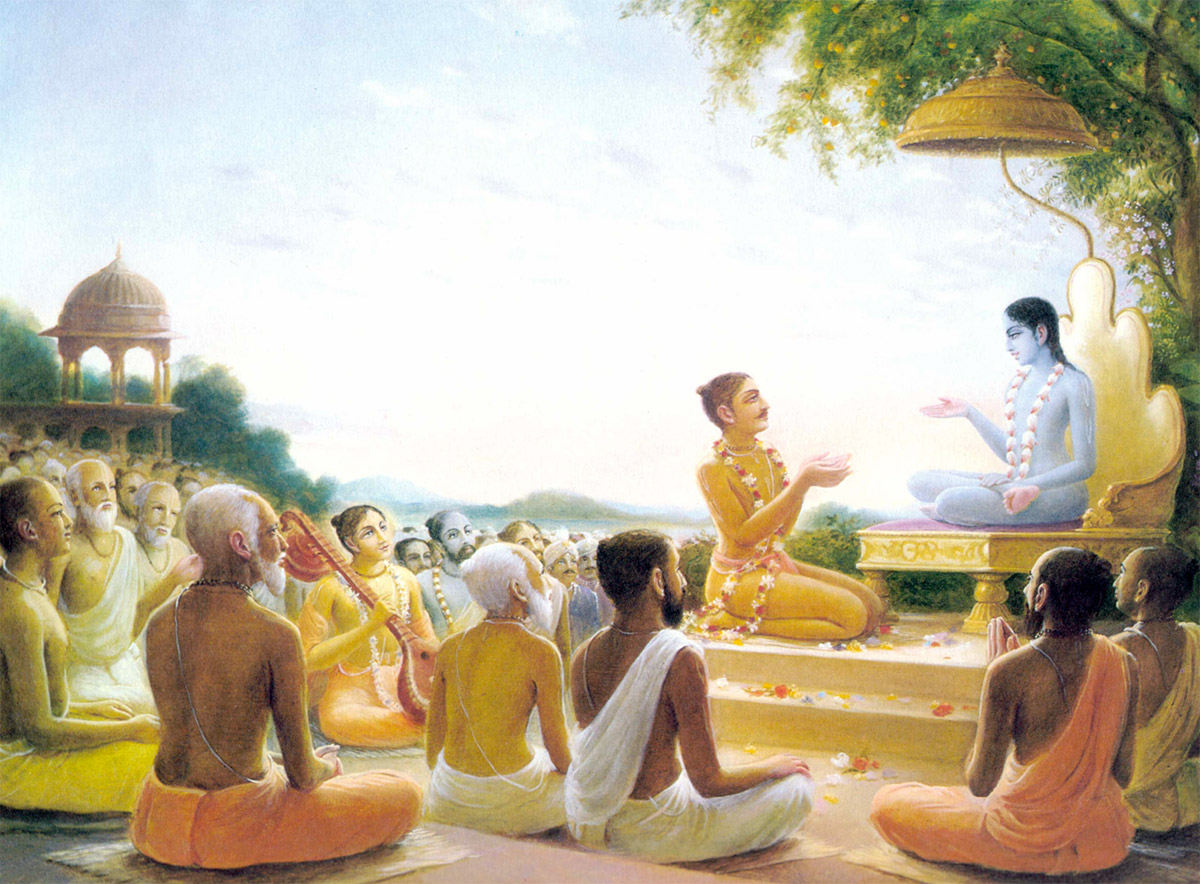
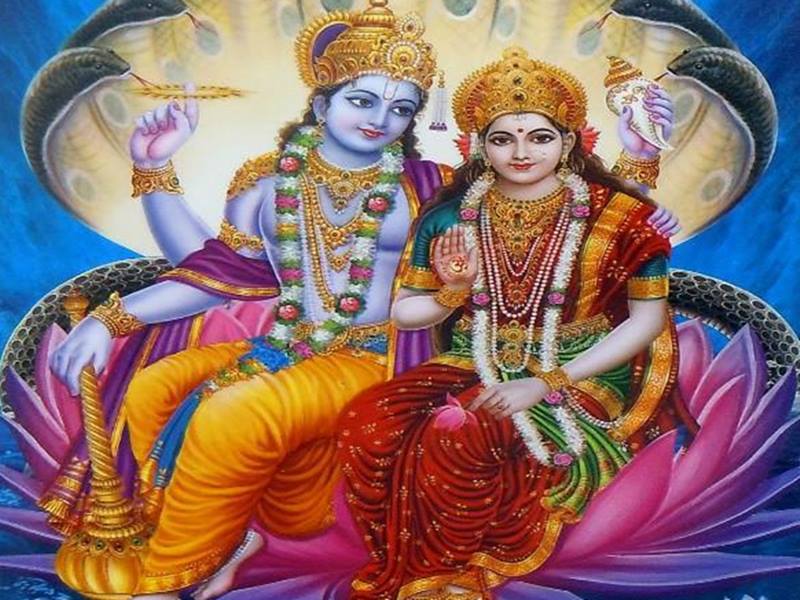
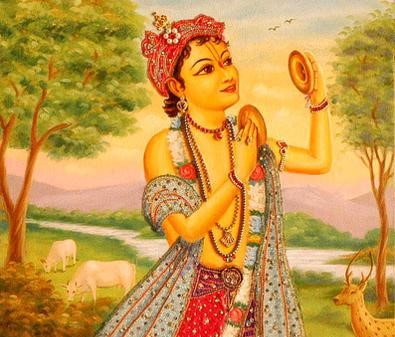
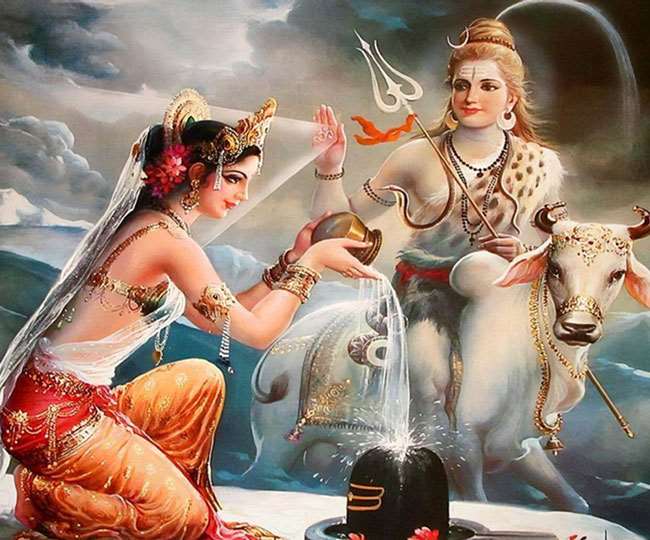
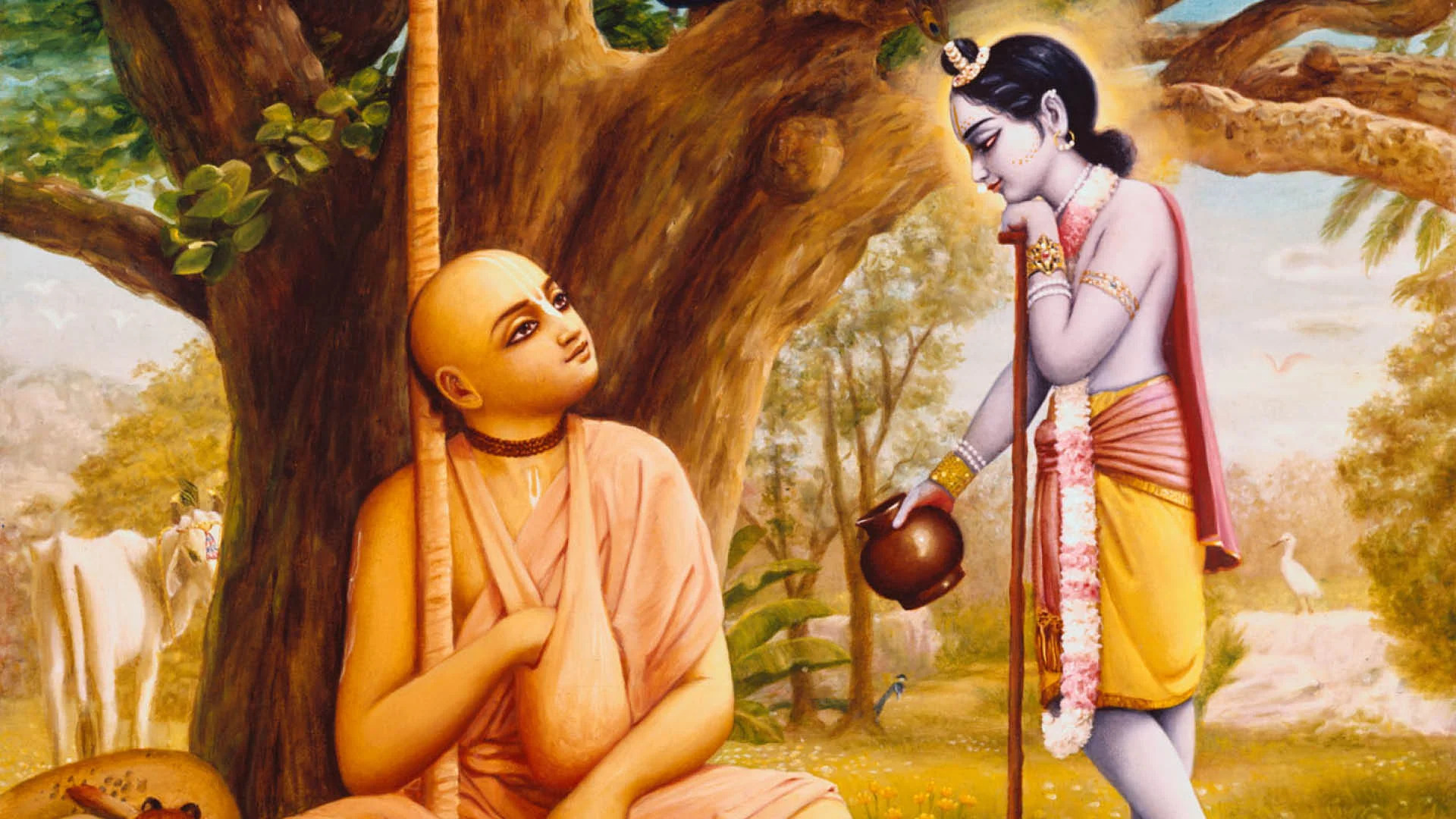
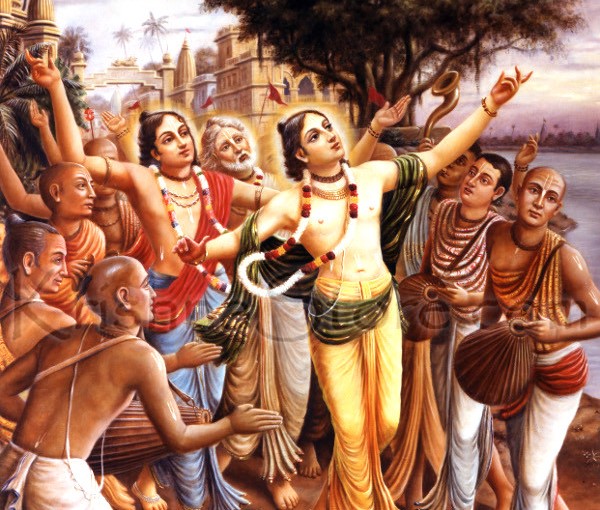
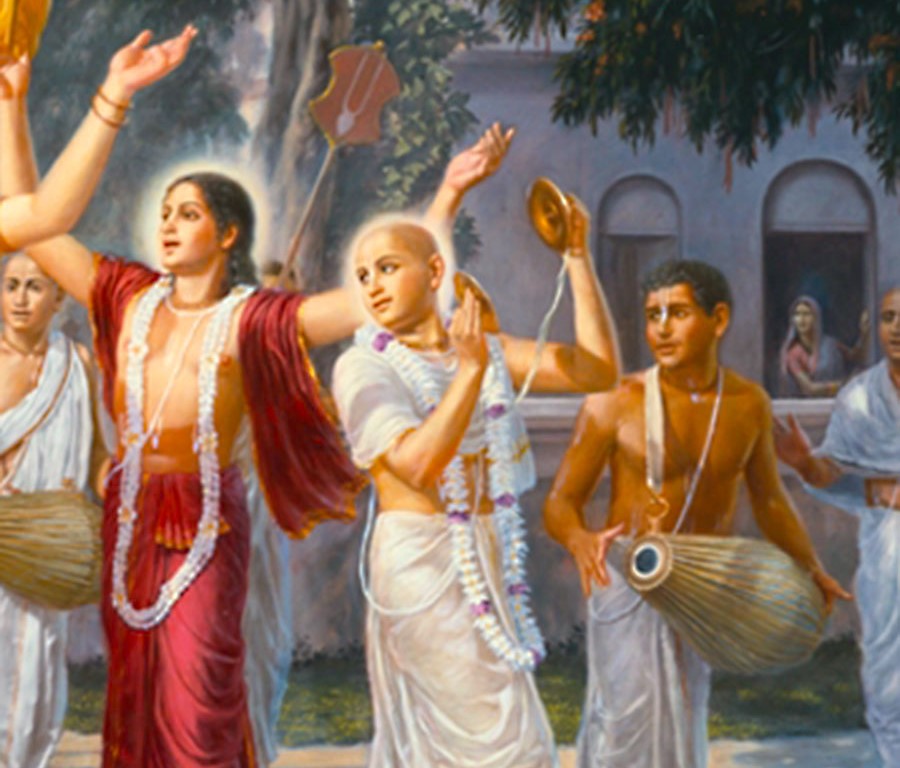
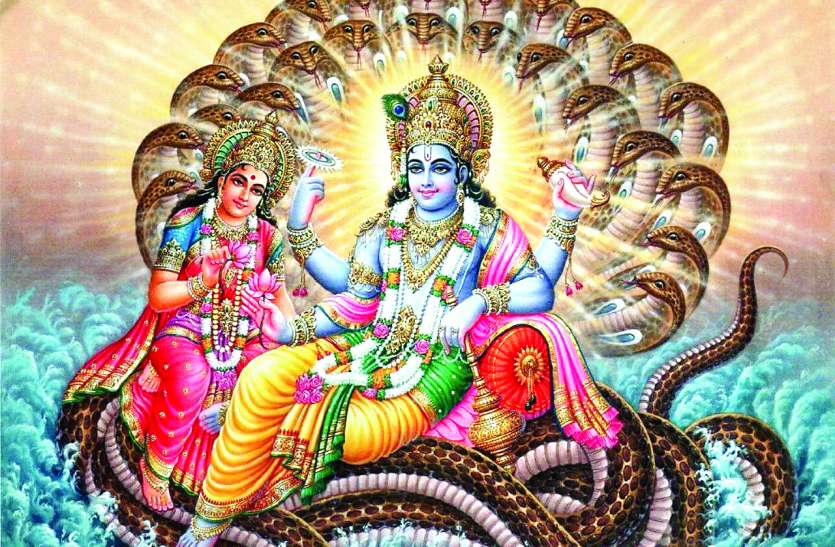
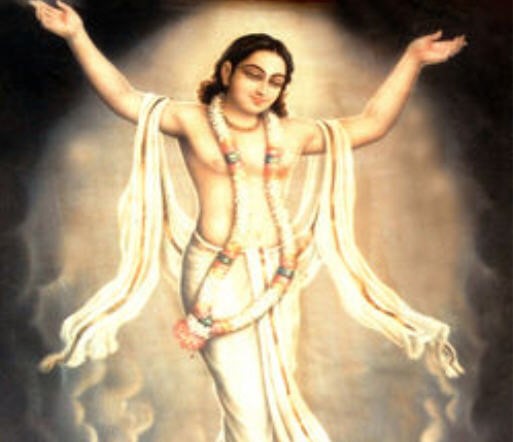
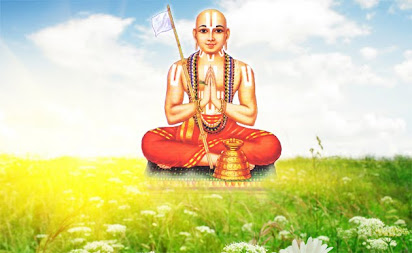
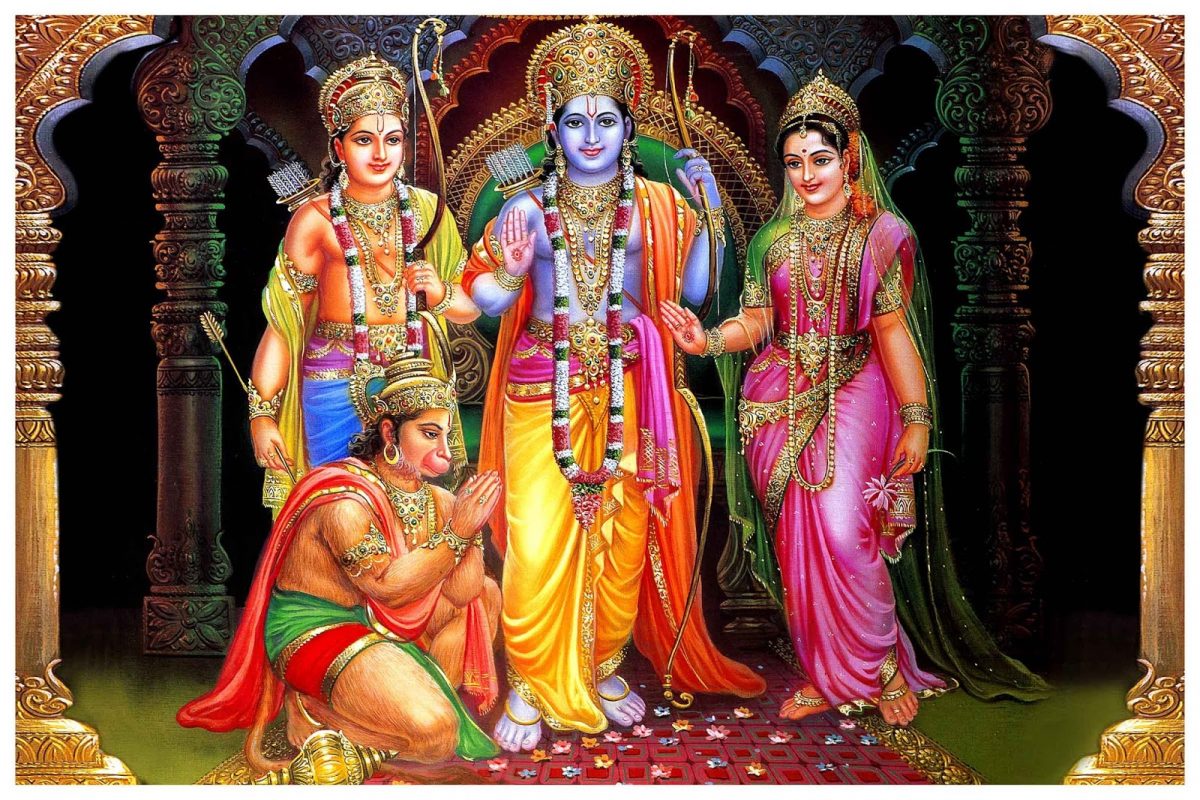
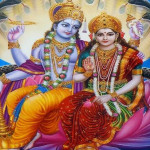
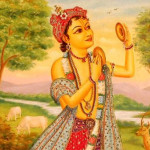
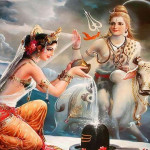
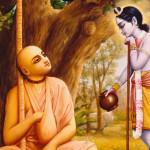
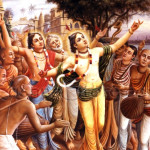
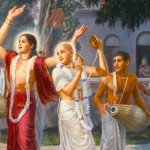
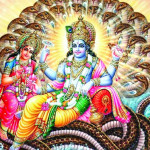
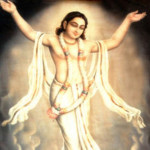
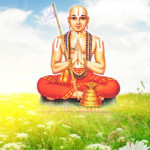
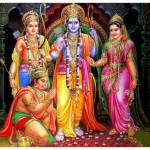








I do not even know how I ended up here but I thought this post was great I do not know who you are but certainly youre going to a famous blogger if you are not already Cheers
fantastic points altogether, you just gained a brand new reader. What would you recommend about your post that you made some days ago? Any positive?